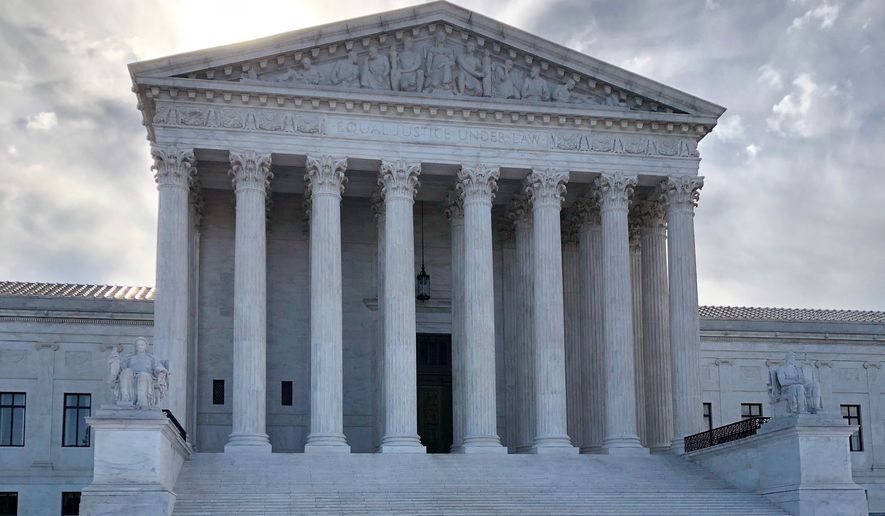The Supreme Court divided along ideological lines Tuesday when scrutinizing House Democrats’ demand that President Trump hand over personal financial and tax records.
The split on the conservative-leaning court would appear to bode well for Mr. Trump’s defiance of subpoenas for the records, but Chief Justice John G. Roberts Jr., a Bush appointee, remains a wild card in the legal battle that could affect the election.
However, justices from both ideological wings of the court expressed skepticism about the Trump legal team’s claim that the president had immunity from a separate subpoena issued in a New York court criminal probe seeking the same financial records.
Chief Justice Roberts signaled that he was open to the president’s claims of political harassment in the conflict with House Democrats, but he quizzed Jay Sekulow, who represented Mr. Trump in the New York case, about how a state grand jury investigation could operate without the common device of a subpoena to gather evidence.
“They are in many respects very similar. In the case of the subpoena itself, they are identical, but I think in other respects they really are quite different,” Justice Roberts noted of the two cases.
He said Congress and the White House often can work together to come up with accommodations for records being sought in oversight investigations, but it is more difficult to work things out with a prosecutor.
The comments came during oral arguments for the two cases, which were conducted via teleconference due to the coronavirus pandemic.
The Democrat-led House Committee on Oversight and Reform last year subpoenaed eight years of Mr. Trump’s family and business accounting information.
The April 2019 subpoena sent to Mazars USA, Mr. Trump’s accounting firm, requested documents “related to work performed for President Trump and several of his business entities both before and after he took office.”
The federal appeals court in Washington, D.C. upheld the subpoena, prompting Mr. Trump’s attorneys to go to the high court, which agreed to take the case.
Other committees in the Democrat-run House also subpoenaed Mr. Trump’s financial records and the cases were consolidated for argument in March, but due to the coronavirus pandemic, the justices rescheduled it for Tuesday.
During the more than 60 minutes of arguments, the four Democratic-appointed justices voiced reluctance to halting Congress’s oversight power.
“There is a long, long history of Congress seeking records and getting them from presidents,” said Justice Sonia Sotomayor, an Obama appointee.
Douglas Letter, general counsel for the House, told the high court that the lawmakers’ subpoena is lawful so long as it is relevant to a conceivable legislative purpose.
The president’s lawyers and the Justice Department argued the requests amount to harassment and violate the separation of powers. They said if the subpoenas were upheld, it could lead to lawmakers continuously seeking personal records — like medical documents and educational transcripts — of a sitting president.
“The president’s personal papers are not related to anything to do with the working of the government,” said Patrick Strawbridge, an attorney representing Mr. Trump.
Chief Justice Roberts asked the lawyer representing the House Democrats how harassment should be measured when several different House committees are investigating the president, all seeking the same personal financial information.
“At what point does the number of committees investigating the president’s personal papers become a factor?” the chief justice quizzed.
Justice Clarence Thomas, appointed by President George H.W. Bush, followed the chief justice’s questioning by noting, “At some point, there is a straw that breaks the camel’s back.”
The justices from both wings of the court, though, were skeptical of the president’s arguments in the similar legal battle between Mr. Trump and Cyrus Vance, the district attorney for the County of New York, who has also subpoenaed nearly 10 years of Mr. Trump’s financial documents and tax returns for a criminal probe.
Mr. Trump’s former personal attorney Michael Cohen was reported to be aiding Mr. Vance’s office in the investigation into the Trump Organization.
Both Republican- and Democratic-appointed justices quizzed the president’s counsel about why the high court should permit Mr. Trump’s claim of immunity in the criminal probe after the high court unanimously rejected the presidential immunity argument in Clinton v. Jones, a civil case brought by Paula Jones against President Clinton involving sexual harassment.
Mr. Sekulow said the 1997 case was litigated in federal court and addressed a civil matter, where this legal battle is criminal and playing out in state court, which has a heightened level of distraction for the presidency.
“There is a different stigma that attaches,” he told the justices.
Mr. Sekulow said the New York subpoena used identical language as the House Democrats’ prior subpoena, suggesting they were working together with political bias to undermine Mr. Trump.
“What is really happening here could not be clearer. The presidency is being harassed and undermined,” he said. “The copying of the subpoena speaks to that.”
Carey Dunne, general counsel for the New York County District Attorney’s Office, flatly rejected any accusations of his office acting in bad faith.
“There is nothing sinister about it,” he told the justices. “You can’t shield a president from all sorts of distraction.”
The justices are expected to issue a decision in the disputes by the end of June.
• Alex Swoyer can be reached at aswoyer@washingtontimes.com.




Please read our comment policy before commenting.